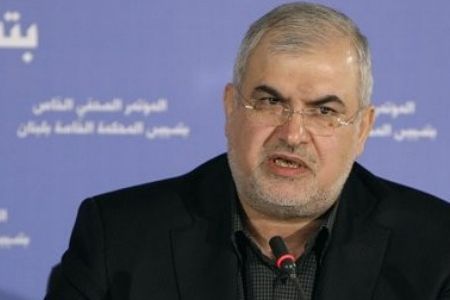 Hezbollah parliamentary bloc leader MP Mohammed Raad linked on Sunday the ability to resolve the garbage crisis to war and peace decisions.
Hezbollah parliamentary bloc leader MP Mohammed Raad linked on Sunday the ability to resolve the garbage crisis to war and peace decisions.
During a speech that he delivered in the southern town of Ain Qana he stressed that political parties that are not being able to “resolve the waste management crisis” cannot ask to have a say in the country’s war and peace decision.
“Is it reasonable that a country in the world cannot find a solution to its garbage crisis?” asked Raad .
“The crisis only exists in Lebanon, and the reason is that there is a crisis of splitting shares and the presence of greed and rottenness inside state institutions,” the MP added.
“The state is too weak to be able to address a garbage crisis,” he underlined.
Raad said certain political parties in the government are asking the people to grant them “an authorization for deciding war and peace with the Israeli enemy.”
“If you can’t resolve a waste crisis, how will you be able to resolve a war crisis or to confront the enemy that is backed by all countries in the world?” Raad asked.
Many in Lebanon blame Hezbollah for the weakness of the state. Ever since Israel withdrew its forces from south Lebanon in 2000, several political forces in Lebanon have accused Hezbollah of maintaining an “illegitimate” arsenal of arms and of monopolizing the decisions of war and peace.
The country’s politics caught up with it in the past month after authorities permanently closed down Beirut’s main landfill. The Naameh landfill south of Beirut had already been kept open for a year beyond its planned closure, in hopes that the government would find an alternative. It did not.
When the landfill closed July 17, Lebanon’s notoriously gridlocked government again failed to take action, leaving piles of smoldering rubbish baking in the sun in the streets of Beirut and its suburbs.
As temperatures rise and the country’s infamous electricity cuts worsen, the sweltering heat and the stinking, rotting garbage is provoking an outcry from Beirut’s two million residents.
“It is a scandal, and what is even a bigger scandal is the politicians who don’t feel the need to resign,” said Paul Abi Rached, the head of the Lebanese Eco Movement.
Despite a public outcry, very few have taken to the streets in protest. In typical Lebanese style, life has gone on, uninterrupted. But the situation may change as anger on the street mounts.
“Shame on them (politicians) and shame on us if we accept to live like this,” businessman Antoine Samaha said. His family was seriously considering taking his mother, who has asthma, to live with his brother in Paris. “Every decent Lebanese should protest this situation.”

Leave a Reply
You must be logged in to post a comment.